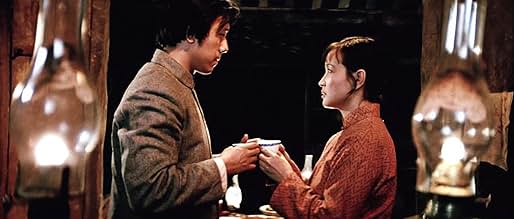Fu rong zhen
- 1987
- 2 h 44 min
AVALIAÇÃO DA IMDb
8,2/10
1,5 mil
SUA AVALIAÇÃO
Adicionar um enredo no seu idiomaLove, humiliation, and politics play out in a distant village of China during the Cultural Revolution.Love, humiliation, and politics play out in a distant village of China during the Cultural Revolution.Love, humiliation, and politics play out in a distant village of China during the Cultural Revolution.
- Direção
- Roteiristas
- Artistas
- Prêmios
- 14 vitórias e 10 indicações no total
- Direção
- Roteiristas
- Elenco e equipe completos
- Produção, bilheteria e muito mais no IMDbPro
Enredo
Você sabia?
- ConexõesFeatured in Century of Cinema: Naamsaang-neuiseung (1996)
Avaliação em destaque
This film caused quite a stir in China when it was first released. The hardline conservative commies opposed the release of this film and the pressure was so great that at the beginning, even the then paramount leader of China, Deng Xiao-ping could not prevent it from being banned.
When the order of banning came, the tickets for release was already sold and audience was enraged. Those conservative hardline commies, themselves were victims of Cultural Revolution, did not have the guts to face the angry public and it had to be the director, Mr. Jin Xie, came under public rage to apologize for the banning.
The film truely touched the nerves of commies, not only for what was infront of the camera, but also what was behind the scene, namely, its proposed releasing and banning. Those hardline commies who were once the victims of Cultural Revolution were in power after the end of that political movement, and as any dictators, once in power, no challenge could be and should be allowed, even if something describing the suffering themselves had experienced and detested.
It was a huge success when the ban was forced to be lifted, and the there was also a radio show based on the novel of the same name, which the film is based on. The small step forward in history seemed rather insignificant for people live in west, where liberty and democracy is taken for granted, but it was a landmark for those who lived under totalitarian rule. What happened when this film first released in China is the vivid example of greatness of this film, not only for what was infront camera, but also what happened behind the scene.
When the order of banning came, the tickets for release was already sold and audience was enraged. Those conservative hardline commies, themselves were victims of Cultural Revolution, did not have the guts to face the angry public and it had to be the director, Mr. Jin Xie, came under public rage to apologize for the banning.
The film truely touched the nerves of commies, not only for what was infront of the camera, but also what was behind the scene, namely, its proposed releasing and banning. Those hardline commies who were once the victims of Cultural Revolution were in power after the end of that political movement, and as any dictators, once in power, no challenge could be and should be allowed, even if something describing the suffering themselves had experienced and detested.
It was a huge success when the ban was forced to be lifted, and the there was also a radio show based on the novel of the same name, which the film is based on. The small step forward in history seemed rather insignificant for people live in west, where liberty and democracy is taken for granted, but it was a landmark for those who lived under totalitarian rule. What happened when this film first released in China is the vivid example of greatness of this film, not only for what was infront camera, but also what happened behind the scene.
- zzmale
- 18 de nov. de 2003
- Link permanente
Principais escolhas
Faça login para avaliar e ver a lista de recomendações personalizadas
- How long is Hibiscus Town?Fornecido pela Alexa
Detalhes
Contribua para esta página
Sugerir uma alteração ou adicionar conteúdo ausente

Principal brecha
By what name was Fu rong zhen (1987) officially released in Canada in English?
Responda






